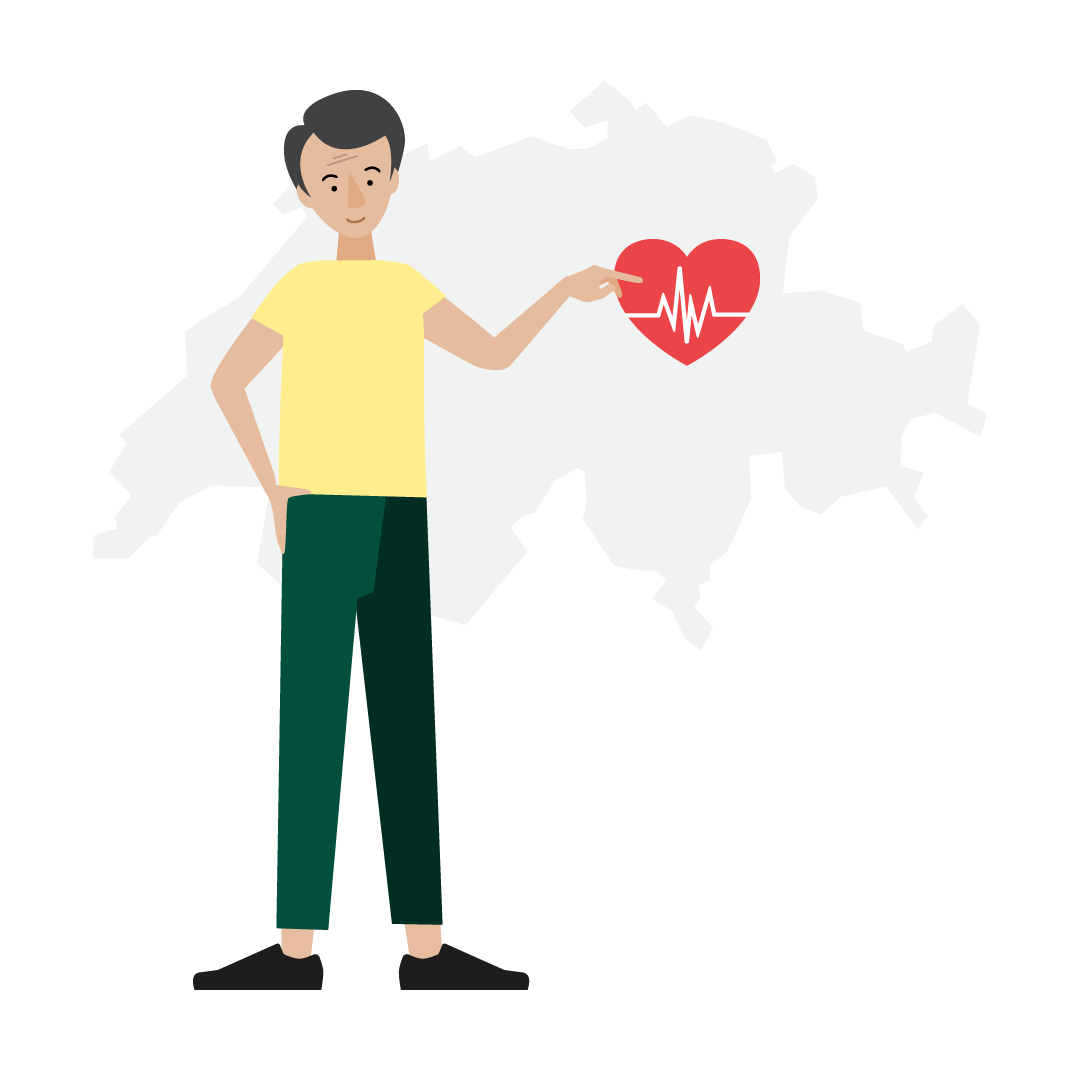
simply explained
Swiss healthcare system
Anyone living in Switzerland can be sure of first-class medical care. Find out more about Switzerland’s world-leading healthcare system.
How is the Swiss healthcare system structured?

In the federalist Swiss health system, the federal government, cantons and local municipalities assume different tasks. The state and private sector have to work together.
-
Government regulates premiums
The government is responsible for basic insurance. It approves or rejects increases in health insurance premiums for basic insurance. The premiums reflect the health costs, which are projected to continue to rise in the future due to the ageing population, growing patient demands and costly healthcare innovations. Nevertheless, you still have the chance to reduce your personal costs.
-
Cantons secure basic care
The cantons are responsible for basic medical care. They play a key role in planning hospitals and their range of services and define the working conditions for healthcare personnel in hospitals. They also provide financial support for hospitals, because the contribution made by the Swiss population through premiums and cost shares is not enough to finance a functioning healthcare system at the highest level. Cantons are also responsible for premium subsidies to support households on low incomes.
-
Municipalities promote health
Municipalities help keep the population healthy by creating the conditions required for a healthy lifestyle. For example, they create public spaces that encourage people to get together, build sports facilities and protect the natural world.
-
Health insurance companies offer insurance cover
The 60 or so health insurance companies protect people against the financial burden of illness, accidents and maternity. They strive to achieve good services at fair prices when negotiating tariffs with healthcare providers (hospitals, doctors, pharmacies, etc.). They are also committed to health promotion and preventive care. Competition between the providers helps ensure better offers and services for customers. The Federal Office of Public Health (FOPH) and Swiss Financial Market Supervisory Authority (FINMA) regulate the framework conditions.
In accordance with the Swiss Federal Health Insurance Act (KVG/HIA), basic insurance is compulsory for anyone who lives in Switzerland. Supplementary insurance plans covering dental treatment or a higher standard of hospital care, for example, are an ideal addition.
Strengths of the Swiss health system...
Every person in Switzerland has access to high-quality medical care, because everyone Swiss resident has the right to be admitted to basic insurance – without a health check. Switzerland also has a very high density of healthcare providers, such as hospitals, pharmacies and medical professionals. In 2018, Switzerland ranked first in the annual Health Consumer Powerhouse survey, which focused on criteria such as patient rights, access to healthcare, therapy results, preventive care, medicines and range of benefits.
…and its weaknesses
The federal government, cantons, municipalities, health insurance companies and healthcare providers (e.g. hospitals) fulfill various tasks. This variety makes it difficult to maintain an overview and to ensure that everyone is on the same page. What’s more, the Swiss healthcare system is one of the most expensive in the world alongside the USA, Sweden and Germany.
You don’t understand terms like deductible, VVG and Tarmed? No problem.

What is the principle of solidarity?
The principle of solidarity has a long tradition in Switzerland and it is based on the idea that all insureds form a group. Each person makes a contribution so that enough money is available if someone requires emergency treatment. This means that even those who are in perfect health and never need to see a doctor pay their monthly premium and thus indirectly provide for those who are ill and need more medical support. Conversely, you also benefit yourself if you fall seriously ill. It is the task of the federal government, cantons, municipalities and health insurance companies to keep this group balanced. That’s why decisions in the Swiss healthcare system are always taken in the interest of the group as a whole.
Premium regions
Switzerland is divided into many premium regions defined by the Swiss government. Premiums are affected by age, sex and place of residence. Generally speaking, premiums tend to be higher in cities than in the country, because health costs are higher in cities as the density of doctors, hospitals and nursing homes is higher. Each canton has at least one premium region, e.g. Aargau, Appenzell Innerrhoden, Basel and Geneva, and a maximum of three – as in Bern, St. Gallen and Zurich.
Our health system compared to other countries

-
Switzerland and Germany
Anyone who lives in Switzerland has to have basic health insurance. Free choice of around 60 health insurers. Health insurers are obliged to accept every applicant into basic insurance regardless of their state of health. Additional benefits, e.g. more comfort in hospital, are available with supplementary insurance plans. Here, insurers decide whether to admit or reject applications on the basis of pre-existing health conditions. Another important difference: Basic dental care in Germany is high. In Switzerland, by contrast, patients have to pay most dental bills themselves – unless they have appropriate supplementary insurance.
Table Example Germany Switzerland Statutory and private health insurance Statutory basic insurance (KVG/HIA) Private supplementary insurance Private supplementary insurance (e.g. alternative medicine) Costs of health insurance covered 50% by employer and 50% by employee Costs of health insurance covered by insured; usually no employer contribution Family premium Per capita premium Same premium for everyone Premium dependent on premium region, age, alternative insurance model (discounts available) Exemption from statutory health insurance possible Exemption from mandatory basic health insurance only possible in exceptional cases Dental insurance is part of health insurance Dental insurance must be taken out separately -
Switzerland and UK
There is no traditional health insurance in the UK. Instead, the state assumes responsibility for healthcare. It is organised by the National Health Service (NHS) and financed by taxes. In Switzerland, every resident pays an insurance premium directly to the health insurance company. A further difference: In Switzerland, you can choose from various care models in basic insurance and save money in the process: free choice of doctors, initial telemedicine consultation or the family doctor model, for example. In Great Britain, you always have to go to your family doctor first. Only those with private supplementary insurance have a free choice of doctor.
-
Switzerland and USA
The two healthcare systems have one thing in common: they are among the most expensive in the world. However, the differences are considerable: Health is primarily a private matter in the USA. In Switzerland, the principle of solidarity is firmly established. Federal health insurance in the USA only exists for the elderly and needy. Otherwise, only those who can afford it or are insured through their employer benefit from first-class medical services. However, many US citizens don’t go to the doctor as it’s too expensive. In Switzerland, all residents have access to high-quality healthcare through mandatory health insurance. Health insurers are obliged to admit everyone without restrictions.
-
Switzerland and France
In France, wage contributions and taxes help to finance the healthcare system, while in Switzerland it is the insurance premiums. These are calculated independent of income. Swiss health insurance companies offer a range of models for basic insurance: free choice of doctors, initial telemedicine consultation or the family doctor model, for example. In France, the family doctor is always the first port of call. While there are no semiprivate hospital stays in France, supplementary insurance plans can be taken out in Switzerland for a more comfortable hospital stay: e.g. in a two-bed room instead of a multi-bed room
Table Example France Switzerland Statutory health insurance. There are several types or "régimes" depending on your occupational status: self-employed, farmer, employee. Basic insurance Financed through social security contributions and taxes Financed by insureds’ premiums Healthcare costs are covered to 70% by statutory health insurance. The remainder is covered by supplementary insurance. There is no deductible or copayment. Insured persons bear the costs of healthcare up to the amount of the chosen deductible and copayment. Supplementary insurance can cover benefits that are not covered by basic insurance. Private supplementary insurance Private supplementary insurance (e.g. alternative medicine) Premiums depend on benefits to be covered, age, insurance model Premium depends on premium region and age. Different insurance models with different discounts Free choice of doctor Different insurance models: free choice of doctor, HMO or telemedicine consultation Exemption from statutory health insurance possible Exemption from mandatory basic health insurance only possible in exceptional cases Dental insurance is partly included under health insurance Dental insurance must be taken out separately -
Switzerland and Italy
Similar to France and the UK, taxes finance the healthcare system, the Servizio sanitario nazionale. In Switzerland, insured persons pay for health insurance benefits with their premiums. In contrast to Italy, Switzerland has a free choice of doctor, provided that insureds choose this model for basic insurance.
Table Example Italy Switzerland Statutory health insurance, guaranteed by the state Statutory mandatory basic insurance (KVG/HIA) offered by a free choice of providers. Private health insurance and supplementary insurance plans (e.g. for specialists and alternative medicine) Private supplementary insurance (e.g. alternative medicine) Contributions financed via taxes/employers All premiums paid by insureds themselves. Amount varies by age, place of residence and insured benefits. The whole family is automatically insured. The premium is calculated per capita. Only specific family doctors and paediatricians are available through the local health services, otherwise private doctors are available for a fee. Free choice of doctors or alternative insurance model Family doctors and paediatricians from the local health service and emergencies in hospital are free of charge. A copayment is charged for specialists, known as a ticket. Every visit to a doctor, including specialists, is covered by the insurance after deduction of a deductible and copayment. A daily flat rate is payable for all hospital stays. Exemption from copayment possible in certain cases Exemption from deductible and copayment not possible There is a cost share for medication, called a ticket. Exemptions are possible in some cases. As a rule, the costs of medication are covered after deduction of the deductible and copayment. Very long waiting times for publicly employed doctors Short-term appointments usually possible -
Switzerland and Spain
Table Example Spain Switzerland Statutory and private health insurance Statutory health insurance Private supplementary insurance Private supplementary insurance Contributions are deducted directly from the salary via income tax Insureds pay premiums directly. Percentage contribution, depending on salary Premium dependent on premium region, age, alternative insurance model (discounts available) Family premium Family premium Medication approx. 40% copayment Selected deductible and 10% copayment (max. CHF 700 per year) No copayment for visits to doctor and hospital Selected deductible and 10% copayment (max. CHF 700 per year) Medical care in health centres and state hospitals Free choice of doctors or corresponding model -
Switzerland and Portugal
Anyone living in Switzerland is obliged to take out basic insurance. It’s not the same in Portugal, where anyone who works there automatically has health insurance. Unlike in Portugal, insureds in Switzerland can choose their own family doctor. It is their responsibility to find a family doctor. It is important to register as early as possible so you are covered if anything goes wrong. First you pay the medical costs in accordance with your chosen deductible. Your health insurance company will then pay all expenses minus your deductible of 10%, up to a maximum of CHF 700 per year.
Table Example Portugal Switzerland Statutory and private health insurance Statutory basic insurance pursuant to the Swiss Federal Health Insurance Act (KVG/HIA) Exemption from statutory health insurance. With private health insurance, all insureds have to pay a premium. The premium is calculated per capita. Premiums for private health insurance can vary strongly depending on the insured benefits. Premiums vary by age, place of residence and insured benefits. With statutory health insurance, you are linked to the centro de saude (health centre) responsible for your place of residence, which offers family doctors and much more. In Switzerland, you have to choose a family doctor yourself. Costs for the doctor’s visit are charged with a small copayment. Contribution to costs with an elective deductible (adults CHF 300 to CHF 2,500, children and young people 0 to CHF 600); Copayment of 10% up to maximum CHF 700 per year Private health insurance offers a lot of benefits compared to statutory health insurance. Basic insurance offers the same benefits for everyone in case of illness, accident and maternity.
Downloads
Frequently asked questions
-
Can I go to a doctor abroad if I live in Switzerland?
Yes, if you’ve taken out Medical Private supplementary insurance. This plan gives you a free choice of doctor abroad, too, for example if you want to receive treatment from your family doctor in Germany.
-
How can I reduce my health costs?
Our money-saving tips will show you how to reduce your premium and healthcare costs.
-
When do I have to register with a health insurance company when I move to Switzerland?
To ensure that you receive the best possible care here, it is important that you register with a health insurance company of your choice for mandatory basic insurance within three months of your arrival. The registration period begins on the day you register with the registration office, i.e. from the date on which your residence permit or foreign national identity card is issued.
-
Which supplementary insurance plans are recommended?
It depends on your life situation and your requirements, for example whether contributions to your personal fitness are important to you, whether you’re planning on having children or whether you want greater flexibility and better service in hospital. You can find an overview of our supplementary insurance plans here.
Any questions? We’ll be glad to help.
Fast advice in 19 languages with no obligation.